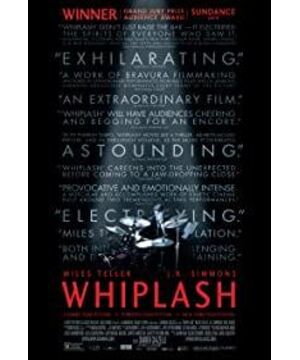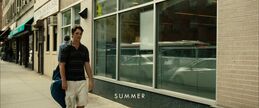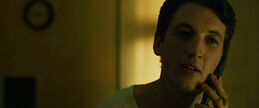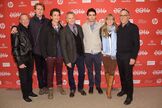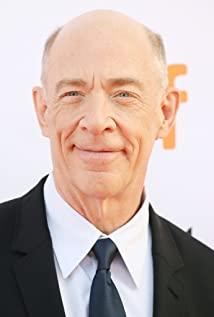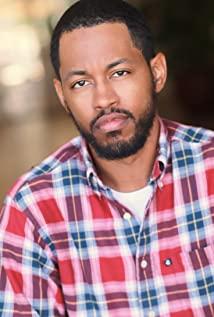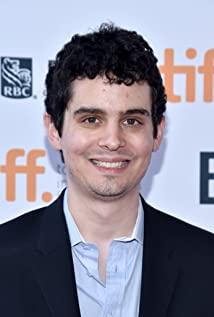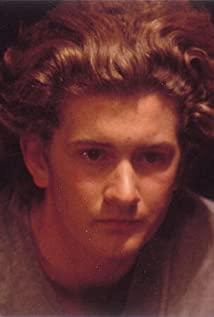I have watched a lot of music movies. From "Pirate Radio" to "Rock Academy", Americans' tolerance for modern music culture and their worship of rock and roll are severely punished by Hollywood. to flourish. But I never really felt attracted to these films, and I often watched them with the mentality of "I'm unprofessional if I don't watch them", so that many movie scenes are now completely forgotten. What attracted me to "Whiplash" at first was his poster, two versions, one with a boy standing on the tip of a giant drumstick; the other with a boy sitting in front of a set of jazz drums with a spotlight down his head, I I thought to myself, "For a movie about jazz musicians, the protagonist is too young, right?"
As I expected, "Whiplash" doesn't have the finesse, the softness of jazz, the rhythmic but precise drumming that hits your nerves and makes you want to sway with the groove but can't find the beat. "Whiplash" has a kind of fast rhythm, fast rhythm is youthful and wild, which is reflected in the roll at the beginning of the film. Director Damien Chazelle doesn't succumb to jazz staleness, of course, and he often laughs at himself as a "failed jazz guy". Chazelle was a jazz drummer when he was young. The band he was in was the "Big Band" in "Whiplash", and his conductor at that time was the prototype of Fletcher in the film. In real life, it is naturally difficult to find teachers who are so extreme in their teaching methods, because Chazelle affixed the shadow of the famous jazz drummer Buddy Rich to Fletcher. Buddy Rich was once known in the music world for his extremely violent and stern style of treating his band. His "Bus Tape Incidents" can also be found on the Internet. In the recording, he is very harsh to his subordinates, just like Fletcher in the film, and his words are unbearable. In-ear.
The influence of Buddy Rich on Chazelle is complicated. The name of Buddy Rich appears many times in the film. Fletcher encourages the protagonist Neyman to learn more about the style of jazz master Buddy Rich. When Neyman rehearsed in Fletcher's band for the first time, Fletcher said: "We got Buddy Rich here!" However, when the conversation changed, starting from "Not quite my tempo", Fletcher became the real Buddy Rich, foul language, roaring, slapping, tears, blood, such a rhythm, let alone jazz, Maybe heavy metals may not be able to. Drummers are really different from other musicians. There is no melody on drums. What drummers need to practice is speed, flexibility, balance, and dynamics, no matter what kind of music they play.
In Chazelle's memory, jazz was loud and intense, and so was the jazz on "Whiplash." After watching it in one go, if I had to describe this movie in one word, it would be "fast". The two core pieces in the film, "Whiplash" and "Caravan," were sped up by the director based on the original. You can search the web for "Whiplash" by jazz trumpet player Don Ellis in 1973, and "Caravan" by Duke Ellington. At the same time, the proportion of jazz drums in the two tracks has been greatly increased for the sake of title.
Usually when we watch a movie and see a good music scene, such as a band or a violin duet in a restaurant, we will feel that the rhythm of the camera will be stabilized by the appearance of the music. And the musical sequence in "Whiplash" almost fills the entire movie, so the difficulty of production can be imagined. There are three points called "TTR" when there are musical scenes in the film, Tempo (speed), Timing (time point), Rhythm (rhythm). And Whiplash is almost perfect in these three aspects. The ups and downs of the whole film follow his musical sequence. The jazz band in the shot does not have much dramatic weight, but it is never boring. Although the jazz drum runs through the whole film But it never feels loud, which is a testament to Chazelle's prowess in controlling camera and sound coordination.
The prelude to the film is one of my favorite songs in the whole film. Justin Hurwitz is a typical conservative composer, the overture of "Whiplash" is a very traditional jazz piece, from arrangement to melody, wind, bass, drums, 6/8 rhythm and mixed with Playful split point. But he did what all film overtures should do: let the melody flow into the audience's ears and stay there. Without this prelude, the structure of "Whiplash" would have been unremarkable, and the appearance of the two subsequent pieces as "protagonists" would have been rather blunt.
I don't know if you remember "When I Wake", Neyman's first date with a girl in the film, a jazz song played in the small restaurant, Neyman was embarrassed to find a topic and told the girl about this 1930s song. Classic track. In fact, "When I Wake" is not a song from the 1930s, but the work of composer Justin Hurwitz. Due to financial problems, the crew did not buy the copyright of the old jazz music, but asked Hurwitz to imitate the style of that era to create. Hurwitz's The music helped a lot, and "When I Wake" was even the opening track for the movie Trailer. It is also the work of Hurwitz, the music played by Fletcher on the piano in the bar, which is the most important music throughout the whole film. Hurwitz found the framework for the entire film, and then used a melody or two to tell the story and motivation of the film. This is also a technique that Hurwitz often uses, and it appeared in another of his works, the 2008 film "Guy and Madeline on a Park Bench". The melody he used has appeared in "Whiplash" in the form of major, minor, 4/4, 5/4, and 6/8 time, and the one in the bar is the most complete and deepest one. It's this piece of music that gives the story room for a twist, breaking the plot out of the way it was before.
Oscar, "Whiplash" won the best sound mixing award, but it didn't even get the nomination for the best sound editing, which makes me even puzzled, because it is the theme of jazz drums, the sound editing is quite difficult, but the quality is already in my opinion. more than some nominated films. Perhaps the Oscars are not ready to let music movies kidnap the sound awards. In any case, this "Jazz Drummer Movie" is a brand new breakthrough for Hollywood music movies in any way.
View more about Whiplash reviews


